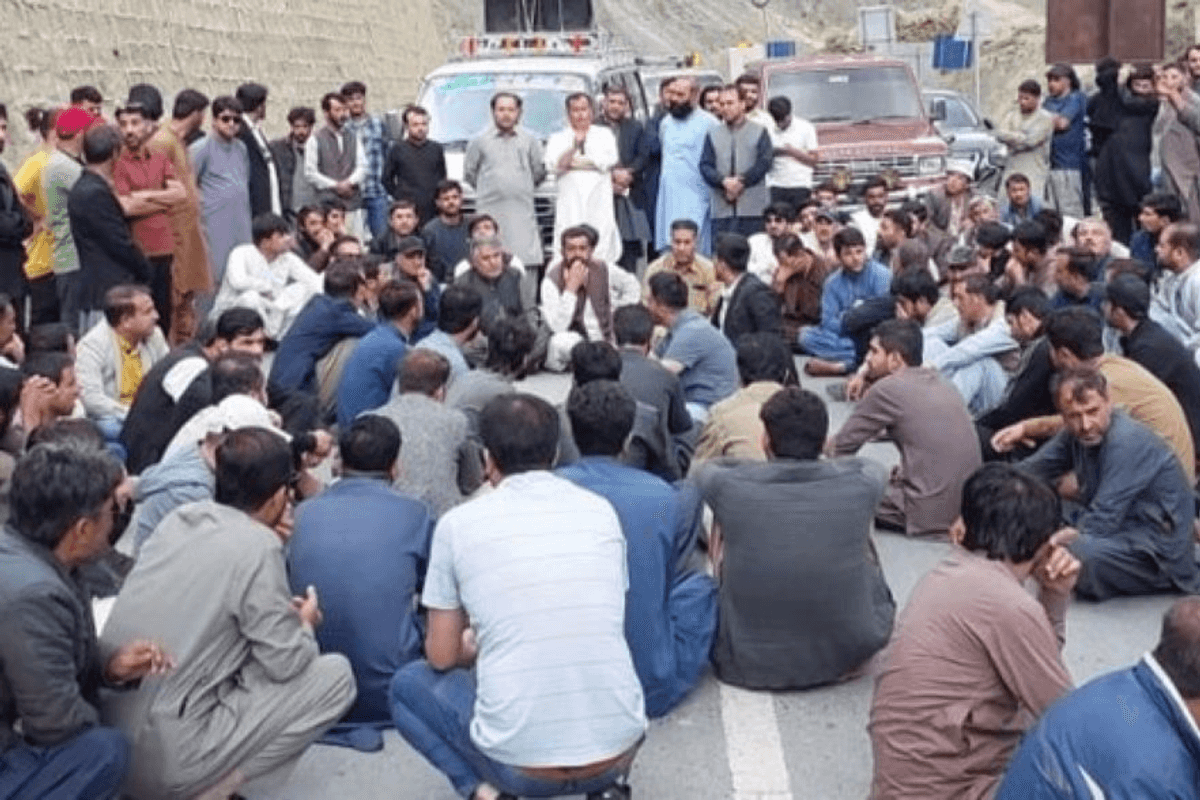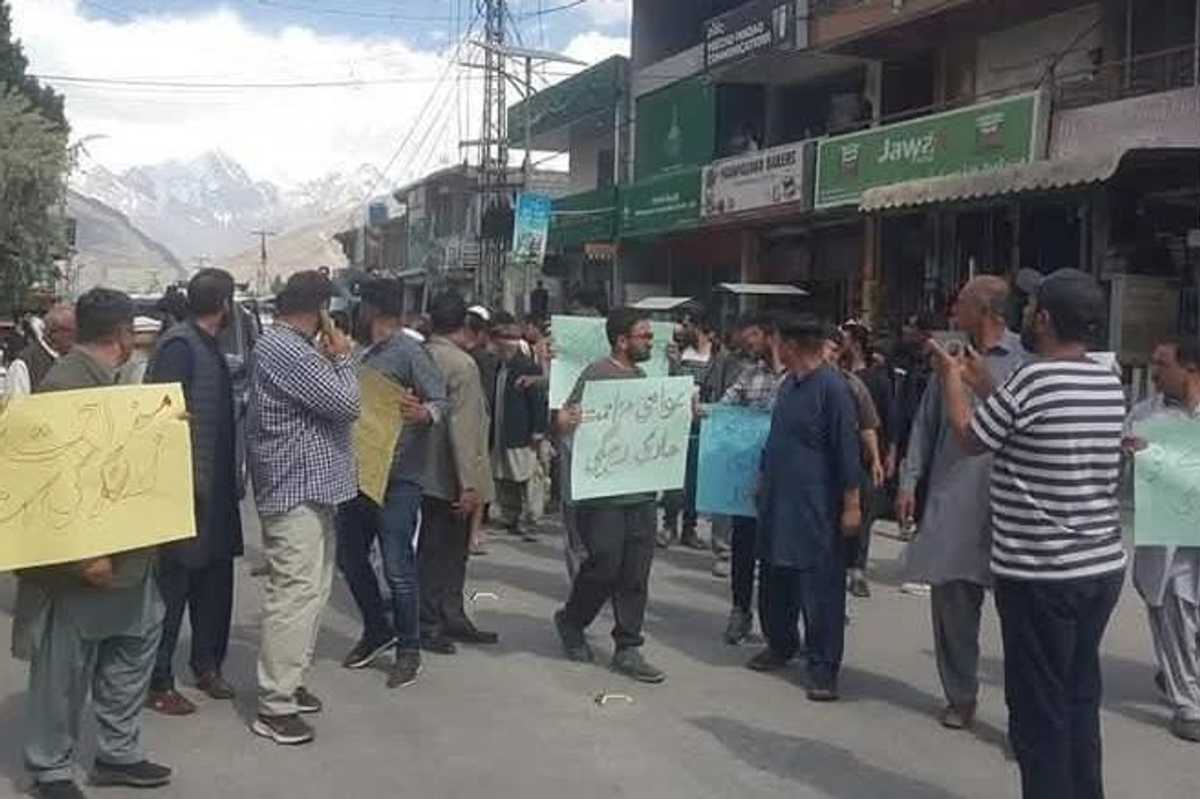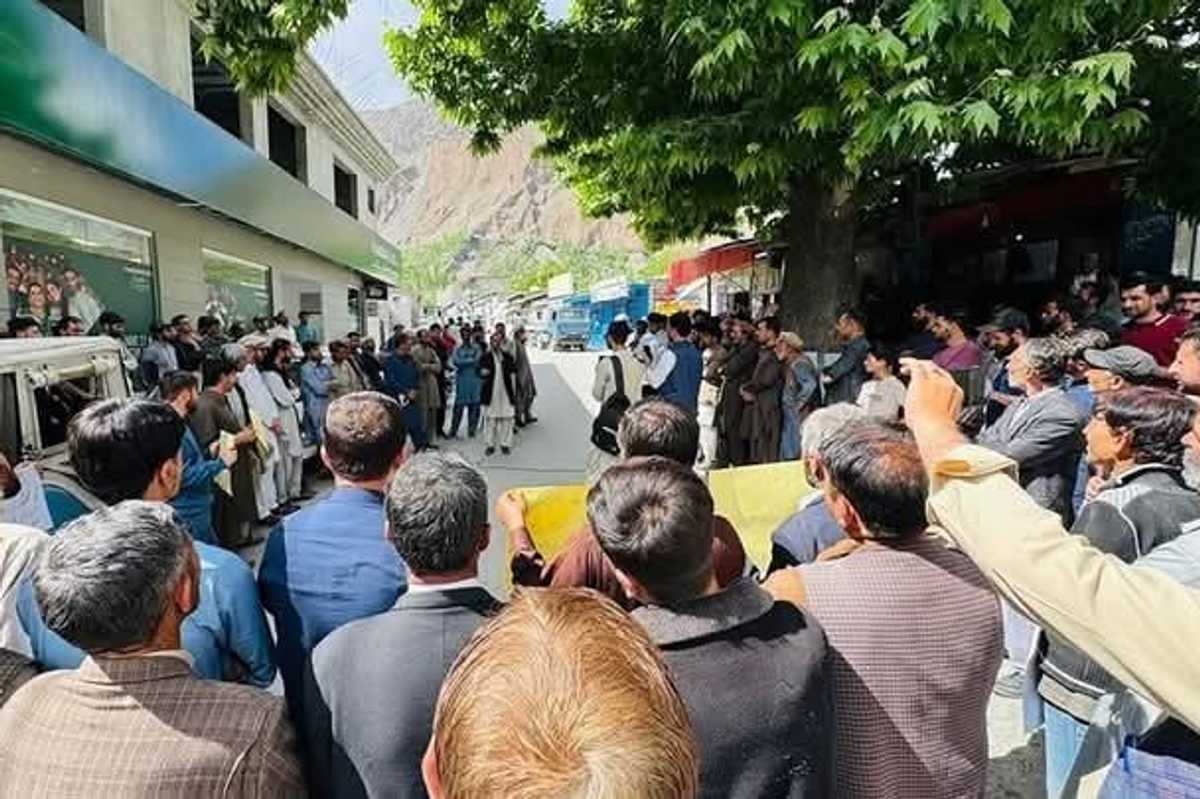Why is a main highway in Pakistan blocked and trade with China stalled
Rising anger over taxes, land reforms, and broken promises has sparked widespread protests across Gilgit-Baltistan, bringing the region to a standstill

Kamran Ali
Correspondent Nukta
Kamran Ali, a seasoned journalist from Khyber Pakhtunkhwa, Pakistan, has a decade of experience covering terrorism, human rights, politics, economy, climate change, culture, and sports. With an MS in Media Studies, he has worked across print, radio, TV, and digital media, producing investigative reports and co-hosting shows that highlight critical issues.

With roads blocked, trade halted, and protests spreading, residents demand an end to marginalization — warning of growing unrest if ignored.
File
Mounting public outrage over taxes, land reforms, and unfulfilled promises has ignited a fresh wave of protests across Pakistan’s Gilgit-Baltistan (GB), bringing the mountainous region to a virtual standstill.
For four consecutive days, demonstrators have blocked the Karakoram Highway - the vital corridor linking Pakistan with China. Residents are demanding an end to what they see as systematic marginalization, with local leaders warning that tensions could spiral further if grievances remain unaddressed.
Pak-China Border closure and tax dispute
A major flashpoint has been the temporary closure of the Pakistan-China border trade route, where local traders have staged protests in response to the suspension of customs clearance and what they call unconstitutional taxation.
Ibad, a representative of the Pak-China Border Traders Action Committee, argued that, "Gilgit-Baltistan, like Kashmir, holds a disputed status and does not fall under Article 1 of the Constitution, which defines Pakistan’s territorial boundaries."
“Sales tax, income tax, customs duties, and all other taxes on GB traders must be abolished,” he said, contending that imposing such taxes is unconstitutional.
The traders' committee also demanded the immediate clearance of vehicles belonging to small traders that have been stranded at the Sost port since February. Besides, it called for taxation of vehicles operated by the state-run National Logistics Corporation (NLC), accusing it of conducting tax-free import and export activities across GB and other provinces.
Muhammad Kazim Maisam, Leader of the Opposition in the Gilgit-Baltistan Assembly, voiced support for the traders, calling the taxation measures unjust. He noted that small traders were previously allowed to import and export up to 40 kilograms of goods tax-free, but the Federal Board of Revenue (FBR) has now imposed what he described as illegal levies.
“If the NLC can transport consignments to other parts of Pakistan without paying taxes, how can taxes be imposed on local traders?” he asked, warning that if the levies are not withdrawn, the Sost port could face permanent closure.
Uproar over land reforms bill
Simultaneously, protests have erupted across GB against the controversial Land Reforms Bill 2024, which was passed by the GB Assembly on May 21. The situation escalated following the arrest of 16 leaders, including Ehsan Ali, central chairman of the Awami Action Committee (AAC). Their detention has intensified public anger and resistance to the bill.
Najaf Ali, Chairman of the AAC’s Baltistan chapter, told Nukta that the legislation is widely seen as a tool to strip the people of their land rights. “We launched protests against the bill and had announced a grand jirga to discuss it,” he said. “But before the jirga could take place, 16 AAC leaders were arrested and falsely charged under the Anti-Terrorism Act (ATA) and accused of rebellion,” he alleged.

At the heart of the opposition are two key clauses in the bill: “Government Land” and “Impartible Land.”
Najaf explained that “Government Land” includes any land owned, acquired, purchased, leased, or held by the GB government or any federal agency -- a definition that, he claims, effectively places 10% of land directly under government control.
“Impartible land,” he added, refers to property that cannot be individually divided. This includes forests, rivers, glaciers, communal spaces like roads and graveyards, and any land designated for public or collective use by the District Land Apportionment Board. The clause also applies to land already considered unapportionable under existing laws.
Maisam criticized the structure of the bill, particularly the appointment of the Deputy Commissioner as head of the District Land Apportionment Board, calling it undemocratic.
“When an elected representative is placed under the authority of a bureaucrat, it makes a mockery of democracy,” he said. He further argued that granting land ownership powers to appointed officials undermines the rights of the people and sets a dangerous precedent.
“If the reforms bill is truly in the public’s interest, why is it only being implemented in Baltistan and Gilgit -- and not in Diamer, the Chief Minister’s ancestral district?” Maisam questioned. He also compared the bill to similar legislation in Khyber Pakhtunkhwa and Balochistan, warning that it could pave the way for the surrender of GB’s mineral and natural resources.
Javaid Ali Manwa, another member of the GB Assembly, echoed these concerns, warning of “dire consequences” from the bill’s passage. He pointed out the lack of a clear definition for “government land,” warning that it could spark disputes during the land allotment process.
“A more prudent approach would have been to pilot the reforms in some of Gilgit’s settled areas first,” he suggested.
The AAC has now announced a grand jirga on June 6, calling for the release of political prisoners and the complete repeal of the land reforms bill.

Adding to the unrest, residents displaced by the Diamer-Bhasha Dam have continued their protest for over 60 days. Communities in the Diamer region are demanding the implementation of the 2010 compensation agreement with the federal government. Their 31-point charter includes demands for payment for both submerged and barren land acquired for the dam project.
What the government has to say
In response to the growing protests, GB Chief Minister Gulbar Khan defended the land reforms bill, stating that people of GB had long demanded the repeal of “black laws” of previous regimes and the recognition of their land rights.
“Previous governments tried but failed to pass such legislation. We have now enacted it to grant the people ownership of their land,” he said.
Khan emphasized that the bill was not passed in haste; instead, it underwent thorough consultation over the past year with public and stakeholder input, and several suggestions were incorporated before it was finalized.
Faizullah Faraq, spokesperson for the GB government, maintained that many of the issues being protested -- particularly taxation and dam compensation -- fall under the federal government’s jurisdiction.
“The chief minister has already raised the issue of taxes with the chairman of the FBR and has taken up the concerns of the Diamer affectees with the federal authorities,” he said, expressing hope for a resolution soon.
Addressing the arrest of AAC leaders, Faraq rejected claims that they were detained for opposing the land reforms bill. “They were arrested for spreading propaganda and promoting anti-state narratives during Pakistan-India tensions,” he said, adding that the matter is now before the courts, and formal cases have been registered.







Comments
See what people are discussing